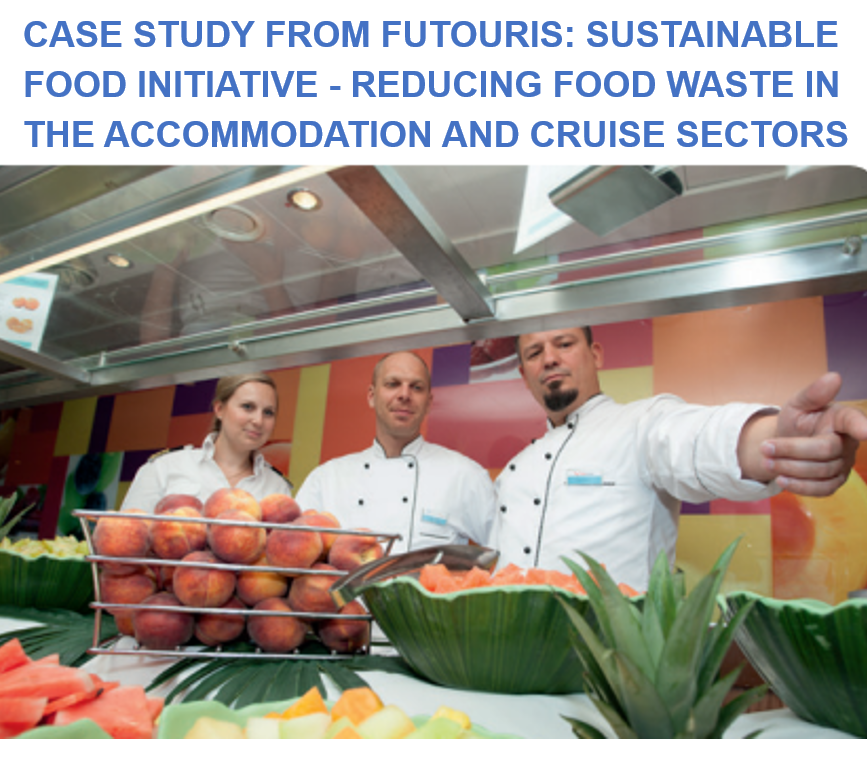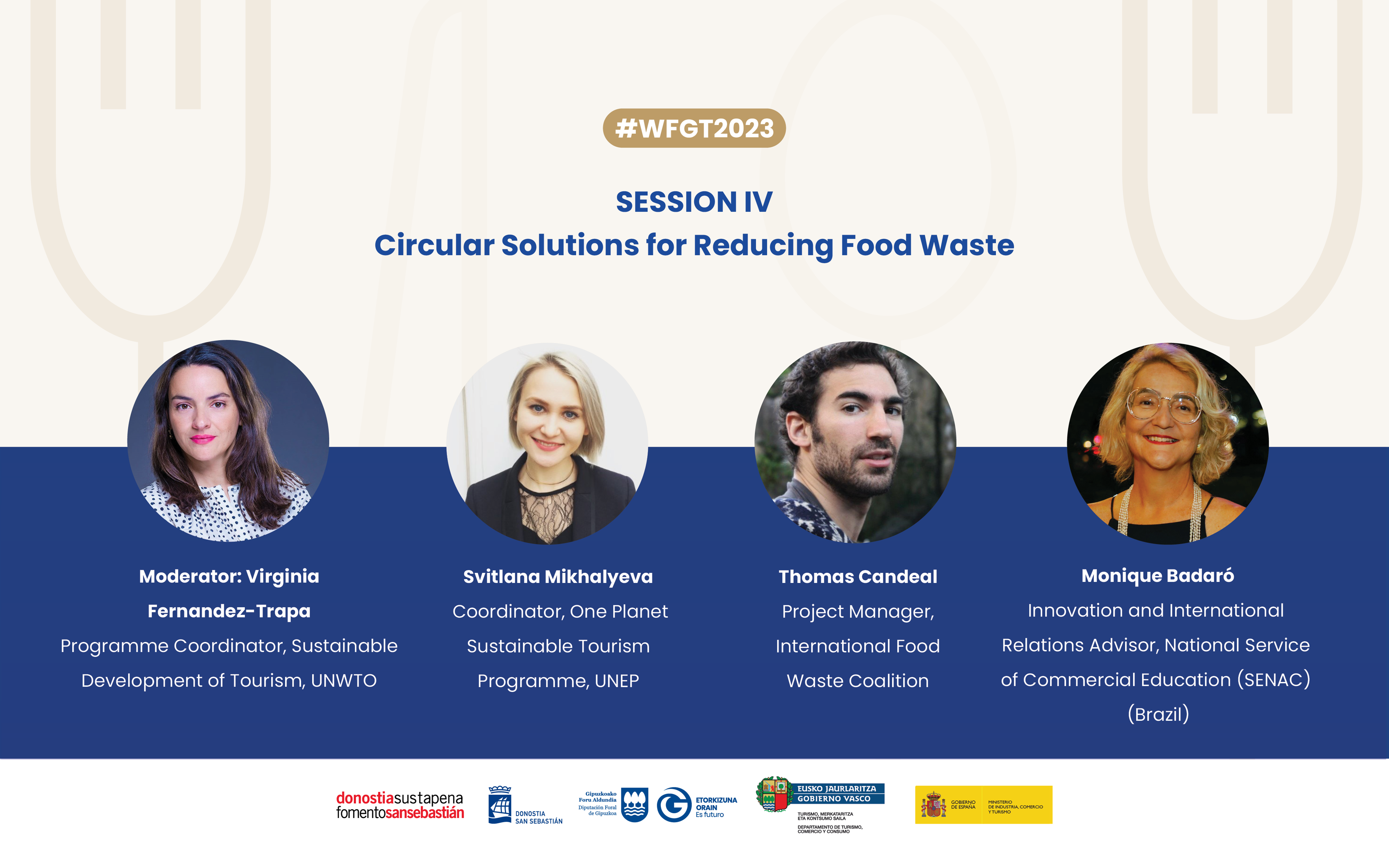CASE STUDY FROM FUTOURIS: SUSTAINABLE FOOD INITIATIVE - REDUCING FOOD WASTE IN THE ACCOMMODATION AND CRUISE SECTORS
Background
 Futouris is a not-for-profit organisation working with its 37 members and other organisations globally to develop a sustainable future for the travel industry. Its Sustainable Food Initiative ran for 4 years between 2015 and 2019.
Futouris is a not-for-profit organisation working with its 37 members and other organisations globally to develop a sustainable future for the travel industry. Its Sustainable Food Initiative ran for 4 years between 2015 and 2019.
Its objective was to produce practical manuals for hotels, cruise operators and other tourism businesses with which they could develop, implement and promote a sustainable food and beverage offer. To achieve this the project included a quantitative consumer survey with more than 8,000 respondents, field visits, qualitative interviews with hotel and cruise ship representatives and systematic, checklist-based assessments of best practices.
One of the main topics of the baseline study was food waste. Key baseline findings on this included:
· Hotels are currently throwing away between 25 to 60% of the purchased food.
· About 50% of this waste could be avoided.
Actions taken
Three key actions were identified:
· Raise awareness of the issue of food waste in tourism.
· Measurement of food waste within the business.
· Continuous improvement and motivation.
These actions were addressed as follows in the project “Avoiding Food Waste” in the Mediterranean:
· Many of the employees engaged through the project were not aware of the environmental impact of throwing food away. By raising awareness of the impact employees became far more engaged. This was reinforced by empowering the employees to come up with solutions to reduce food waste and hence taking ownership and responsibility for implementation. The topic of food waste reduction was integrated into the general sustainability trainings for staff to maintain the behavioural change in the long term.
· Food waste measurement was carried out in partner hotels to demonstrate the extent of waste and the savings potential if food waste was reduced. Over a period of several weeks, the participating hotels measured food waste (with an online tool provided by United Against Waste e.V.) in the following areas: storage, production, overproduction (mainly from buffets) and guest plate waste. Results from these measurements were then analysed and processes, practices and behaviours which resulted in high wastage of food were identified. It was identified that the “All Inclusive” concept led to guests taking much more from the buffets than they could eat, leading to very high plate waste. Another example was that the entire choice of food offer was provided on buffets until the very end of the mealtime to ensure guest satisfaction. This led to high overproduction waste from the buffets. This analysis was then presented to management and relevant staff (from kitchen, restaurant service and purchasing departments) so that improvement measures could be developed.
· Round table meetings were held with key staff including general managers and executive chefs to motivate and discuss possibilities for reduction and jointly create further solutions.
Impacts achieved
Over 40 hotels in Greece, Spain, Italy, Egypt and Germany joined the project and worked towards reducing food waste. 10 hotels did precise measurements of their food waste and implemented various improvements measures. 30 hotels were reached through awareness raising workshops and trainings.
· For the hotels participating in measurement, food waste was reduced by on average 28%. In total, 58 tonnes of food waste were saved across the 10 hotels.
· Two of the pilot hotels managed to reduce food waste by approximately 400 kg per week. These hotels reported savings of approx. EUR 26,000 per season due to reduced food purchasing and waste disposal costs.
· In the parallel project “Reducing food waste on cruise ships”, the participating TUI cruise ships, reduced food waste by over 17%. The three measures with the biggest effect were:
o Introducing continuous opening hours at the main buffet restaurant between 6:30 a.m. to 9:30 p.m. meaning that there are no clearance phases in which food is disposed of before time control.
o Bread on demand: Setting up the table only when guests arrive.
o Less is more: smaller bowls, buffet inserts and food containers on the buffet in conjunction with careful replenishing/refill behaviour.
Examples of the food reduction measures that were implemented to achieve these savings included:
· Smaller portions and plates on buffet.
· Smaller serving spoons.
· Analysing buffet and plate leftovers to adapt menu to guest preferences.
· More show cooking to enable portion control by staff, particularly on cruise ships.
· Better communication of occupancy rates to the kitchen
· Communication to guests on how their actions can help reduce food waste, i.e. posters at the entrance of the restaurants, table and buffet displays.
Three manuals were developed as a result of the initiative:
· Sustainable Food Guest Communication Manual (with ready-to-use templates for guest communication materials on reducing food waste)
· Food Waste Reduction on Cruise Ships Implementation Guide
Lessons learned
To effectively minimize food waste, it is necessary to measure food waste in different divisions, as only this complex measurement allows for a deep analysis to determine where reduction potentials lie. To avoid misinterpretation, food waste measurement should focus solely on the main restaurant, depending on available resources. Some hotel employees were not as precise when measuring their waste, resulting in incorrect measurements at first; therefore, all involved staff members should be made aware of measurement and training on how to apply it.
Picture protocols of the leftovers on the buffet after the end of the mealtime are very helpful to visualize how much is thrown away. These have had a great effect on the project engagement of head chefs, F&B or purchasing managers as they hadn’t been confronted with the food wastage so directly beforehand. Measures to avoid food waste must be developed in cooperation with the employees to guarantee wider support for the issue. The participating actors must discuss the topic in a dialogue at eye level to avoid hotel employees feeling overruled.
“For all food waste reduction initiatives, the motto “You cannot reduce what you do not measure” should be used as a guiding principle, as measuring and analyzing the food waste is the key to unlocking reduction potentials.”
Tatjana Peters, Project Manager
The case study has been provided by in support of the Global Roadmap for Food Waste Reduction in the Tourism Sector demonstrating the value of taking action to prevent food waste.
External source(s)



